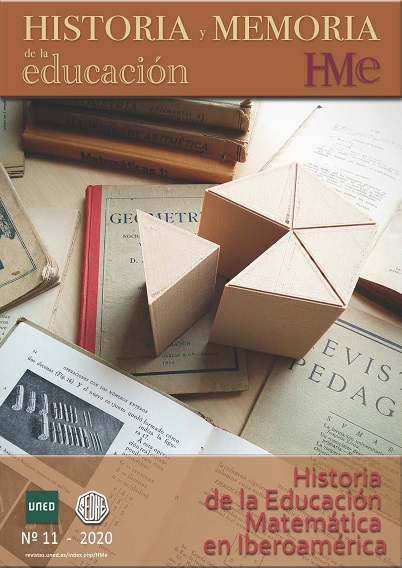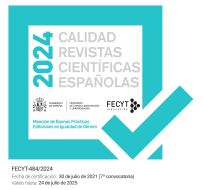La resolución de problemas como un saber necesario en la formación de profesores, una matemática para enseñar
DOI:
https://doi.org/10.5944/hme.11.2020.23248Palabras clave:
Matemáticas a enseñar, Matemáticas para enseñar, Formación de profesores, Historia de la educación matemáticaResumen
El presente texto problematiza «resolución de problemas» y «Resolución de problemas» como cosas de diferentes naturalezas. Con este fin, guiado por la pregunta: ¿Se ha trabajado la resolución de problemas durante muchos años en términos de conocimiento que se debe enseñar «savoir à enseigner» y no como conocimiento para enseñar «savoir pour enseigner?». La resolución de problemas gana la escena y se reclama basado en marcos teóricos y metodológicos, estado epistemológico de saber enseñar, matemáticas para enseñar. Además, se afirma que tal conocimiento para enseñar está en el corazón de la formación docente en matemáticas y su enseñanza. Para respaldar esta afirmación, destacan los documentos oficiales de Brasil, por ejemplo, la nueva Base Nacional Curricular Común (BNCC), todo lo cual subraya la importancia del trabajo de resolución de problemas. Finalmente, cuestionamos el papel desempeñado por George Polya como formador de maestros.
Descargas
Citas
Bertini, Luciane de Fátima, Rosilda dos Santos Morais and Wagner Rodrigues Valente. A Matemática a ensinar e a Matemática para Ensinar: novos estudos sobre a formação de professores. São Paulo: Livraria da Física, 2017.
Brasil, Ministério Da Educação. Base Nacional Comum Curricular (BNCC). 2ª versão. Abril. 2016. Available at: http://historiadabncc.mec.gov.br/documentos/bncc-2versao.revista.pdf.
Brownell, William. «The progressive nature of learning in mathematics». In Mathematics Teacher. 100 Years of Mathematics Teacher, NCTM, vol. 100, Special Issue, 26-35. Reston, VA: NCTM, 2006. First edition 1944.
Foucault, Michael. As palavras e as coisas. São Paulo: Martins Fontes, 1999.
Guimarães, H. M. «Polya and the Mathematical Capabilities». Educação e Matemática, APM, 2011.
Hofstetter, Rita and Bernard Schneuwly. «Saberes: Tema central para as profissões do ensino e da formação». In Saberes em (trans)formação: tema central da formação de professores, organizado por Rita Hofstetter and Wagner Rodrigues Valente, 113-172. São Paulo: Editora Livraria da Física, 2017.
Morais, Rosilda dos Santos. «O processo constitutivo da Resolução de Problemas como uma Temática da pesquisa em Educação Matemática – um inventário a partir de documentos dos ICMEs». PhD diss., Educação Matemática, Universidade Estadual Paulista “Júlio de Mesquita Filho” – UNESP, 2015.
Morais, Rosilda dos Santos and Lourdes de la Rosa Onuchic. «Uma abordagem histórica da Resolução de Problemas». In Resolução de Problemas: Teoria e Prática organized by Lourdes de la Rosa Onuchic, Norma Suely G. Allevato, Fabiane Cristina H. Nogutti and Andresa Maria Justulin, 17-34. Jundiaí: Paco Editorial, 2014.
Polya, G. Mathematical Discovery – on understanding, learning, and teaching problem solving. John Wiley& Sons: United States of America, 1962.
Rey, Bernard. «Les compétences professionnelles et le curriculum: des réalités conciliables?». In Savoirs Professionnels et curriculum de formation, organized by Yves Lenoir and Marie-Hélène Bouillier-Dutot, 83-108. Canadá: Les Presses de l’Université Laval, 2006.
Schroeder, Thomas L. and Franklin K. Lester Jr. «Developing Understanding in Mathematics via Problem Solving». In New Directions for Elementary School Mathematics, 1989 Yearbook of the NCTM, organized by Trafton, P. R. and A. P. Shulte, 31-42. Reston, VA: NCTM, 1989.
Thorndike, E. L. The new methods in Arithmetic. 1921. [S.I.]: On openlibrary.org. Available at: http://archive.org/stream/newmethodsinari00thorgoog#page/n136/mode/2up
Valente, W. R. «Oito temas sobre história da educação matemática». REMATEC 8, no. 12 (2013): 22-50.
Veiga-Neto, A. Foucault & a Educação. Belo Horizonte: Autêntica. 2003.
Descargas
Publicado
Cómo citar
Número
Sección
Licencia

Reconocimiento – NoComercial (by-nc 4.0): Se permite la generación de obras derivadas siempre que no se haga un uso comercial. Tampoco se puede utilizar la obra original con finalidades comerciales.









